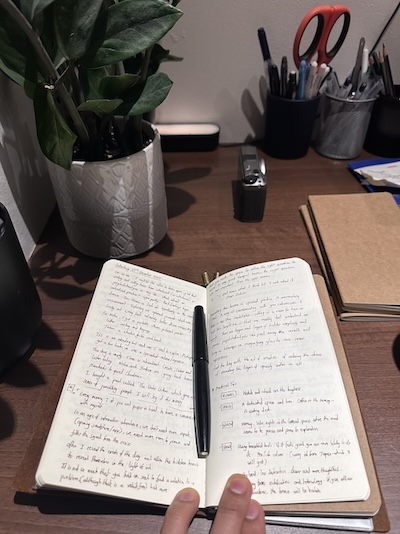telling stories
I wish I was a better storyteller.
I remember during our recent trip to Hawaii, we spent 3 hours with our eccentric American driver as we drove through the winding road to Hana (after landing on the wrong side of the island). I was captured by his monologues cataloguing his life in Hawaii, including meeting the Top Gear crew, his encyclopaedic knowledge of Axis deer and his belief in Aliens. It was the best ’live podcast’ episode I’ve listened to.

I thought, this is why I love Americans. They are some of the most extroverted, engaging people. I also thought ‘God I wish I could tell stories like that’.
This is my attempt to write some advice to myself on how to do this.
Write down your stories
I feel like the best stories have been told multiple times. They are not off the cuff, even though they seem to be. They’ve been forged in the furnace of ’trial and error'.
One of my university flatmates was a terrific storyteller. During a house party, I remember him telling the same story to 3 different groups of people (and he had them captured). Intentionally or unintentionally, a good story is usually good because it’s been told multiple times and refined.
This is where writing about your life (diaries) is useful; not only in remembering your own life, but in cataloguing all the funny, extreme and insightful stories one inevitably ends up in.
The hook
Start off with the hook. A hook is a sentence that introduces an unsolved mystery into the listener’s mind ; something that makes them want to know the answer.
Storytelling is about strategically withholding information
For example (benign to more and more deranged). The questions of ‘why’ and ‘how’ are introduced in each :
- “I had the worst day yesterday”.
- You’re not going to believe who I ran into at the gym…"
- I think I just witnessed the most awkward first date in history
- Today I learned why you should never try to be helpful at airport security.
- “It turns out you can accidentally become a cult leader.”
This is in contrast to just stating the facts of the story : “I punctured my car tire yesterday 10 minutes from my house and had to call a £50 tow to move my car up the road” (happened a few months ago, it was at the bottom of a giant hill in all fairness).
Stating everything upfront, takes away all of the mystery from the story.
The best storytellers tend to introduce many hooks throughout the narrative by raising questions without immediately answering them.
Elaborate
After the hook, comes the elaboration. This is where you delve into the details of the story. It is slowly colouring in the black and white pencil sketch you’ve introduced with your hook.
Short and sweet is better in general. Introducing too much irrelevant detail takes away from the narrative. Remember, the core of story telling is about withholding information ; introducing questions and dragging out the reveal of the answer.
It’s probably therefore best to tell stories chronologically. This keeps an air of suspense because then you aren’t spoiling what happens later. Tell the story as you experienced it during the time.
Over the course of the story, you should answer the question/s introduced by your hook/s.
Reflect
The very last few sentences should answer your hook.
Generally the best stories, then have some takeaway or reflection. They may be formative moments (heroes journey), painful moments (tragic) or plain bizarre and funny (’the punchline’).
Examples:
- Humorous twist : “thats why I always carry a rubber chicken in my glove compartment”
- Life lesson : “sometimes the most memorable conversations happen when your plans go completely wrong”
- Character growth : “It made me realise I’m not as introverted as I thought - just selective about my audience”
- Full circle : connecting back to your opening hook in a satisfying way
Going back to the initial story I told about our American driver. I could say " I wonder if he tells the same stories to every tourist, perfectly refined over years of practice. But then I realise - isn’t that exactly what makes them so good? We’re all just practicing for our own live podcast episode."
Writing
I was listening to a talk with Pico Iyer (after reading his most recent book), and someone asked him how he remembers all these stories and details. He reached into his pocket and pulled out a small notebook. He just writes it down there and then, when the details are not clouded by fading memory.
In my last solo trip abroad, I decided to do this and ended up with a whole notebook full of observations and details that I would have otherwise been lost. In an age where we can record video and take photos of wherever we go, what we miss out on is the subtle internal dialogue that can only be captured by writing it down there and then.
iPhone notes is probably the easier way.

Conclusion
This is a process. I want to become a better storyteller for myself, so I can make sense of all the beautiful memories and trips I’m privileged to be able to experience.